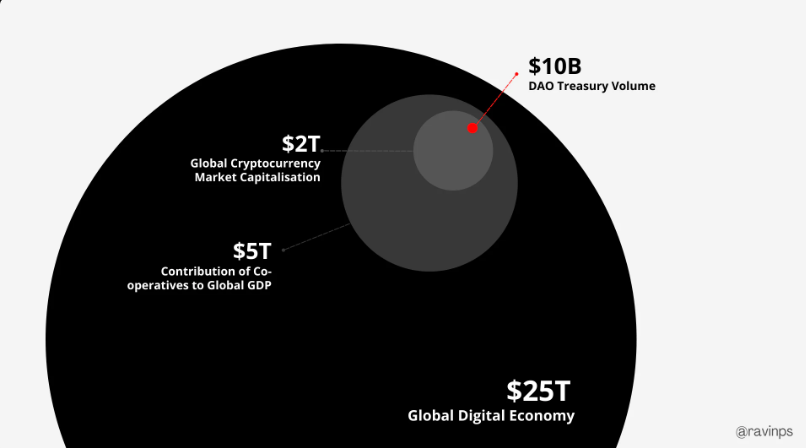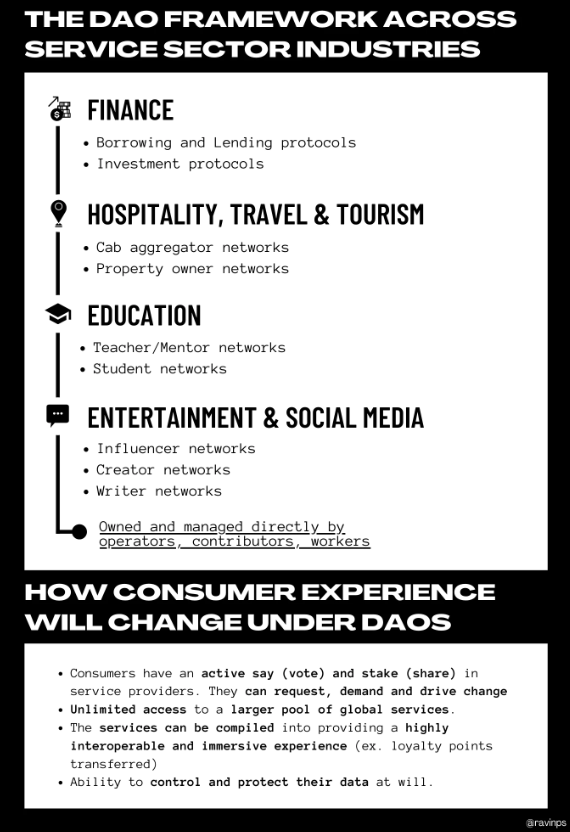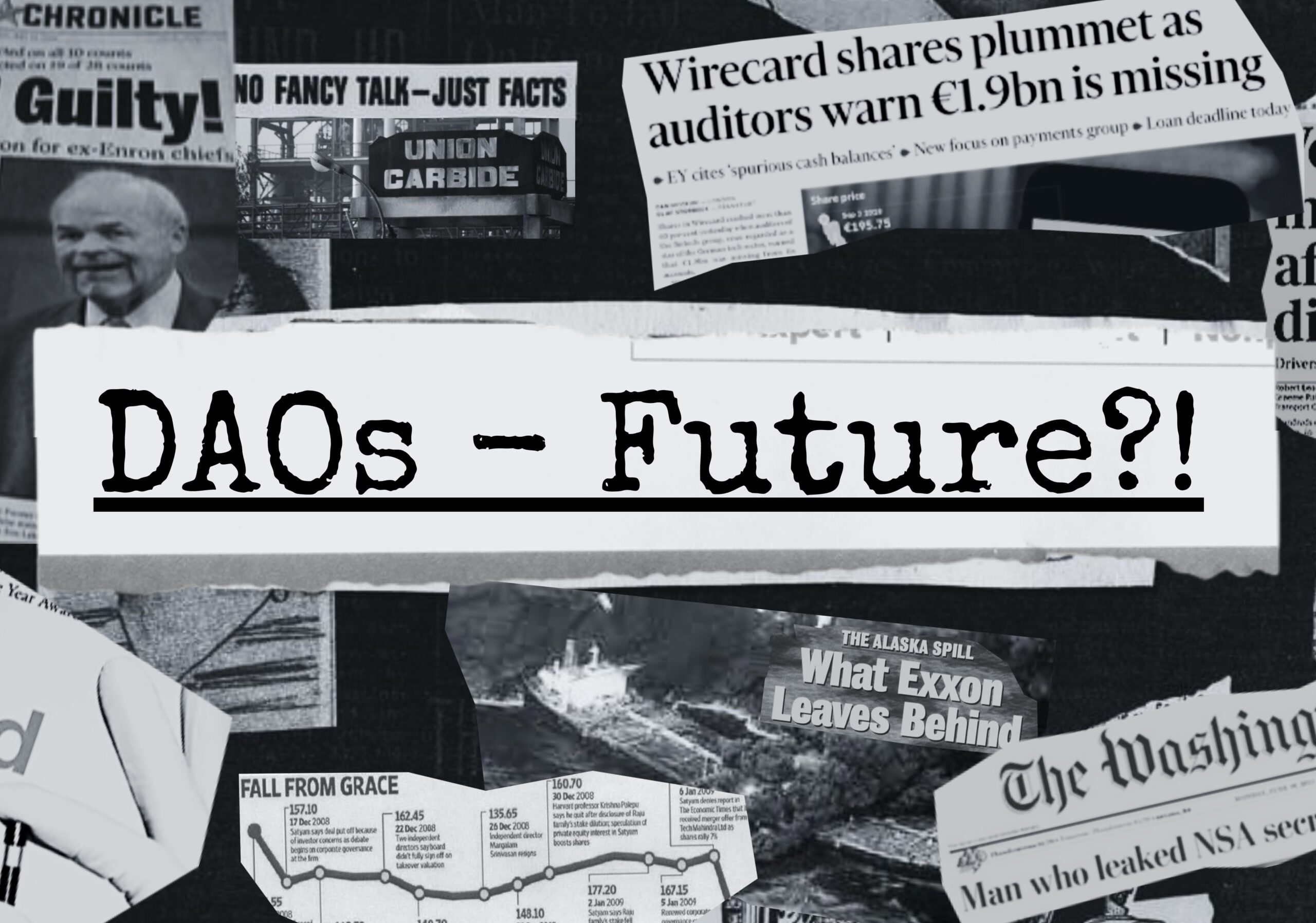DAOs will provide meaningful maturity (wisdom and grey hairs) to the Internet
The corporate form first came into existence in the 1600’s when the British Crown began granting monopolies to groups of investors that were willing to undertake certain ventures. These monopolies, called ‘joint-stock corporations’ represented the first organisational framework that allowed capital and labour to be aggregated for performing tasks that were too much for an individual.
This framework evolved and permuted into different shapes and sizes over time, giving us the public-limited, private-limited, LLC, partnership and proprietorship structures that we adopt today. These structures have been single-handedly driving all economic growth, value creation and innovation for humankind. They are responsible for the provision of all goods/services we consume and they cater to and control almost every aspect of our lives.
As efficient as they have been for aggregating hundreds and thousands of people to pursue a common goal, these frameworks and their realised corporate models have been outdated for over a decade due to primarily focusing on generating shareholder wealth, that is increasingly becoming unsuitable for today’s global community.
The corporate organisational structure fails to embrace the values of democratic governance and true value creation
Despite all efforts by corporate leaders, management guru’s, professors and theorists, ranging from the mandatory governance initiatives (CSR, appointing Independent directors) to creating the ‘fitter, flatter and faster’ structures that modern companies are proudly embracing and advocating, in reality, corporations remain highly centralised structures. They are controlled completely by a group of boardroom insiders, who are powerful beyond measure and possess the ‘ability’ to impact thousands or millions with every single decision.
NSA’s global surveillance programs that breached privacy, false reporting scandals like Enron and Wirecard, or Exxon-Valdez and Union Carbide like tragedies where mismanagement caused severe damage and loss to human life and environment. Our history is full of cases where the centralised control of power corrupted the best among us, and their selfish decision-making eventually resulted in massive losses – financial, physical and emotional; for the many dependent (real) stakeholders who had no voice or say in the process, but ended up being the casualties left to suffer by no fault of their own.
These dreadful centralised corporate structures have lingered on in our society because they are the only way we know to effectively organise ourselves as large groups that can drive economic value. The liberal, democratic and equitable purpose-oriented co-operative society model has proven its mettle in a few industries (Agriculture, Insurance & Financial Services, Wholesale and Retail) but it has struggled with widespread global adoption.
While the 300 largest co-operatives contribute between 2-3% to the global GDP, the 50 largest corporations alone account for over 28% of the same.
But, no more … I believe that we are finally at a point where codification will help us win over greed and corruption with a new digital framework that is both efficient and fair to all.
DAOs are the great equalisers that can redistribute power, control and wealth by breaking the shackles to create a new compassionate and future-proof avatar of capitalism
DAOs are a new organisational species, built entirely on top of open blockchain networks represented by rules and logic encoded in transparent computer programs. They represent a balanced organisational model that can help us with the practical realisation of compassionate capitalism.

Figure 1: The qualities of a Company vs a DAO
By design, the ownership, management and operation of a DAO is distributed amongst the members of a community (founders, workers/contributors, customers/users), all of whom hold different types of tokens. This allows DAOs to operate as fully digital decentralised structures governed by all token holders.
They liberate and transform existing organisational structures when it comes to:
- Fostering global participation – People across boundaries can join forces to achieve a common goal. They don’t need to follow traditional recruitment practices, processes or set up physical offices. Anybody with access to the internet and a willingness and ability to contribute can instantly join a DAO, opening the frontier to a global talent pool.
- Incentivising participation for increased levels of engagement – DAOs can break structured roles and responsibilities into bite sized tasks called ‘bounties’ that can be taken up by anyone. They allow members to participate in critical decision making and driving consensus based change. A hybrid free-flowing structure gives individuals the freedom, sense of recognition and motivation to go above and beyond in driving the DAO forward. On tools like Boardroom or Tally, members can propose any change, quickly and easily, and invite other members to vote on the same.
- Being suitable for multiple purposes and being highly responsive – Every DAO today is pursuing a different objective – ranging from helping manage and run fundamental protocols (Protocol DAOs), investing in rare and expensive NFT’s or digital crypto assets (Investment/Collector DAOs), offering grants to developers and even something as trivial as buying a rare hard printed copy of the US constitution. The ConstitutionDAO, that did the last part, managed to raise over $40M for the auction in just a little over one week.
- Absolute transparent culture wins and retaining innovation as a core value – The existing corporate structures are driven by over-rated strategy building and painstaking focus on planning, which is most often an inaccurate depiction of capacity and capability of the organisation. Enterprise systems and various workplace methodologies have struggled to bridge the gaps between management (sitting in ivory towers) and doers on the ground. Alternatively, every action and transaction in a DAO can be viewed, audited and verified by virtue of running on open immutable blockchains. In theory, it’s almost impossible to conceal information or secretly impose control from a closed boardroom. So, an Enron or Wirecard can never happen in a DAO. While today’s corporate structures fail to protect conscience and integrity, DAO flip the equation with a hardcore focus on culture which fosters transparency, equality, measurable integrity and active experimentation. It’s known that culture eats strategy for breakfast, and this is why DAOs are able to constantly experiment and in fact their survival is based on continuous innovation.
- Operational efficiency and unit economics – By design, DAOs can operate with much better unit economics because they can avoid most major expenses that a global organisation must typically incur ( rent/lease/licensing ). Additionally, as digitally native organisations managed entirely on code, DAOs can automate administrative repetitive tasks (treasury management, making payments) by leveraging smart contracts and customised tools to operate in a relatively lean and flexible manner. Uniswap (DEX) being able to process higher transaction volumes than Coinbase (CEX) with just 10-15% of the workforce is an example in point. In the long run, AI DAOs also show the potential to further expand the scope, and someday we could witness fully-automated DAOs powered by AI and Robotics with ‘humans on the edges
DAOs instantly re-invent and re-structure to adapt to the fast-changing environment that we live in today. They can maintain positive-sum relationships between participants at all times and ensure that a large proportion of active members are incentivised and engaged to help drive the DAO closer to achieving it’s objectives.
DAOs will undergo the test of time and critics, before becoming synonymous with the third Era of the Internet
Technology follows society and society follows technology…..

Corporations organised the Industrial era and drove society over the last two centuries. But, in the new-age digital economy that we are consciously building, I envision DAOs as the tool that can effectively decentralise all digital businesses and markets.
At present, there are close to 200+ active DAOs operational on-chain (only those that are tracked by DeepDao. These range from 100-member to 100K+ member communities, holding over $8B in treasury volume that is governed by 1.8M+ governance token holders.
Over 80% of the cumulative DAO treasury volume is held by DAOs involved in DeFi, running Decentralised Exchange (DEX), Staking and Lending protocols. The remaining 20% volume is spread across a wide range – metaverse, gaming, developer, investor/collector, social/media DAOs among other new use-cases, and only a select few these have managed to scale as much as DeFi DAOs.
DAOs are still in the early experimental phase. They possess the superior traits of an advanced organisational specie, but, to establish real-world dominance over existing corporate structures, they will go through critical stages of evolution. This evolution process will have two stages:

Stage 1: Applicability and implementation within Web3
In stage 1, we will see the DAO framework getting holistically refined to become the default organisational structure for Web3.
Today, the process of setting up a DAO is complex and time-consuming for newcomers. Post-setup, teams still face the challenge of cohesively optimising:
- Participation – Most DAOs have voter turnouts of less than <5%
- Engagement – The ratio of active contributing members vs passive members is highly skewed
- Efficiency – As non-structured fluid groups, DAOs are prone to getting paralysed by the BikeShed Effect, resulting in an enormous wastage of resources (time, energy and money)
Even the most prominent DAOs holding massive multi-million dollar treasuries are struggling to find and maintain the perfect balance between these three qualities, especially as they scale in size.
Over the last 18 months, more than $100M in venture funding has gone into projects focused on DAO tooling and quite a few of them have done a good job at simplifying specific aspects of DAO setup and management. These include projects building standard smart contract frameworks (Aragon, Snapshot), automated treasury management solutions (Coinshift, Parcel, Llama), contribution and compensation (Coinvise, Rabbit Hole), governance and voting (Boardroom, Tally), incorporation (Upstream).
2025 will see simplification of DAO framework and it’s solidification as the default framework for all digital collaboration in Web3.
Stage 2: Replacing traditional corporate structures for tech corporations and/or competing with them
In stage 2, we will see the DAO framework go mainstream and receive traction from companies that are currently outside of the Web3 ambit. Here, the most critical piece in the puzzle for DAOs to take on traditional corporate frameworks will be regulations.
I expect DAOs to generate and capture more value in stage 1. As their share (as a subset of the cryptocurrency market cap) increases from 0.5% ($10B levels) to over 5% ($100B levels) and as larger DAOs become the way of work and life for a larger global population, we will see fundamental regulatory layers getting structured. Similar to how the formation of regulations on crypto-currencies was accelerated in 2017 due to the massive spike in market capitalisation (from $20B to over $0.5T in a 18 month span), the more value DAOs will capture, the more regulatory interest they will receive.
However, once major legal and geographic jurisdictions give DAOs a real-world identity that is distinct, we will see traditional corporations start experimenting with the DAO framework. This will obviously be subjected to them having a non-limiting framework around liability, accountability, taxation and governance.
There will be a number of different trigger points for traditional corporations to adopt the DAO framework. But, they can be categorised broadly within two buckets:
- Proactive – Driven by the goodwill, foresight and vision of forward looking founders, CEO and leaders that embrace the ‘community exit’ way of life.
- Reactive – Driven by the migration of bottom-middle level stakeholders in pursuit of better economics – extrinsic (higher shareholding in tokens vs corporate ESOPs) and intrinsic (freedom to work multiple jobs, take lead, participate in governance etc). Here, we will witness the formation of DAOs going head to head against traditional corporations in several industrial pockets. For example, a taxi-aggregator protocol that is owned and managed entirely by cab-owners and drivers taking on the Uber’s of the world.
Undoubtedly, there is massive potential and the possibilities are truly endless.
Early indicators suggest that the businesses and organisations involved in offering a digital product/service will be the first group to adopt the DAO framework in some shape or form. This includes consumer facing applications of all kinds (Finance, Entertainment, Utility) and the IT services industry as a whole. These constituents, as part of the tech and digital economy are poised to contribute $25T to the global GDP by 2025 (1/4th of the total). So, indeed there is a lot of room for the DAO framework to effectively decentralise businesses and markets.

DAOs will redefine the future of work by creating global pools of digital freelance and gig workers. They will automate governance in part or whole for organisations. And, in turn enable the formation of a business playground that is efficient, equitable and compassionately capitalistic.
This playground will be fuelled by the DAO framework along with adjacent distributed computing led applications like Cryptocurrencies, Decentralised Finance and Tokenisation. These applications have also seen the light of day and are going through their own evolution processes. At the end of the tunnel, the convergence of these technologies will enable the next generation of automated decentralised organisational structures to compete and collaborate with each other in transforming the service sector for the citizens of the next generation.

I’m excited to see if DAOs can erase the geographic boundaries between nations and states and redistribute the almighty power held by socio-political institutions. Because, I truly believe that when this happens, humanity could move on from being the world that is driven by collaboration of conflict and/or economics, to being the world where democracy and trade is driven by collaboration for survival and sustainable living.
As a frontline rescue pilot, I have witnessed first hand how, despite the best efforts, underlying politics and division can cripple progress when we are dealing with global crises like the Covid-19 pandemic. Global co-ordination fuelled by codification has the power to significantly improve our efficiency in times like this and help save human lives by distributing responsibility and accountability.
During my C-level leadership tenures across setting up airlines to hardcore industrialisation to complex services business, there was always a commonality of two global constraints – speed of trade and the ethics of business. Hopefully, DAOs will initiate disruption, fuel change and lay a foundation for the transformation of global trade and its economics in the future.
DAOs represent the best of what that the next generation of internet has to offer. This internet will be advanced, engaging, sophisticated and closer to it’s open-sourced roots. It will continue to be the ultimate force for human freedom and creativity.
Perhaps, this mature vision of the internet is what we call Web3 today…😊
Closing thoughts
Up until the Russia Ukraine war, humanity was living through what can be termed it’s most peaceful time ever, especially when we compare it to the geo-political instability that was prevalent through the 19th century. The advent of Data and Technology opened our civilisation to bring us where we are today, and Web3 can further accelerate this process and remove all boundaries between us.
In line with this open paradigm, ideas and concepts are transparent to anyone and everyone to catalyse the realisation of ideation. In this new wave of co-creation and transparency, some of the papers I referred to are listed below-
- Protocols and Creator DAOs: Economic Flows and Cultural Products by Jarrod
- DAO Briefing by Mario
- Squad Wealth by Sam & Toby
- DAO Landscape by Cooper
- Organisation Lego’s by Nichanan
- Thoughts on DAO tooling by Patrick
- The Future is DAO: A Primer on DAOs and Their Explosive Growth by Richard
- How to grow Decentralized communities by Peter
- The Dao of DAOs by Packy
- DAOs, Reputation and the Future of Work by Andrew
- Building an economy within a DAO by Shreyas
- The Slow Death of the Firm by Nick
- The Next Big Unlock for DAOs by Frogmonkee
- What a DAO can – and can’t – do by Andrew and Jonathan
- How DAOs are changing Leadership by Anastasia
As enlightening as these resources were, ultimately, it is the realisation of ideas that fuels real change. Operators and contributors are the real sculptors that are carving the future of our civilisation and I would like to acknowledge some of the notable individuals and projects, who in my opinion are doing a great job of perfecting and scaling the DAO framework.
Hayden from Uniswap, Martin from Gnosis, Kento from UXD Protocol, Konstantin from Lido, Robert from Compound, Esteban from Decentraland, Julian from Ribbon, Zeus from OlympusDAO, Kain from Synthetix, Joey from Fei, Stani from Aave, Chris from DXdao, John from SuperRare, Kevin from Gitcoin, Rune from MakerDAO, Jesse from AaveGotchi, Gavin from Kusama, Alexis from Radicle, David from Bankless, Ian from SyndicateDAO, Matan from DAOstack, Peter from MetaCartel, Tyler from Barnbridge, ,BitDAO, Yam and The Lao.
While these individuals are deeply immersed in manifesting the technology of tomorrow, I also want to call upon the corporate leaders of today, to closely think about this movement and evaluate it’s merit independently, so that they too can join the revolution and fuel the decentralisation of our global economy.
Elon Musk, Jeff Bezos, Bill Gates, Warren Buffet, Mark Zuckerberg, Richard Bronson, Jack Dorsey, Satya Nadella, Sundar Pichai, Shantanu Narayen, Eric Yuan, Tim Cook, Jack Ma, Parag Agarwal, Ma Huateng, Ginni Rommetty, Brian Chesky, Chuck Robbins, Bob Swan, Daniel Schulman, H. Lawrence Culp Jr. and Enrique J. Lores.
In addition, I’d appreciate if leading voices and influencers can provide their support by simplifying and amplifying the reach of this paper. It is essential for them to continue performing their role as the messengers of knowledge, wisdom and ideas that eventually shape our society.
Roger Cheng, Sean Kerner, Kara Swisher, Sarah Perez, Dieter Bohn, Dan Seifert, Matt Quinn, Ryan Browne, Brad Moon, Joanna Stern, Peter Rubin, Mike Casey, Will Gottsegen, Amitoj Singh, Rachel Wolfson, Tom Farren, Daniel Roberts, Jeff John Roberts, Steven Ehlrich, Nina Bambysheva, Jeff Kauflin, Oliver Dale, Jacquelyn Melinek and Ben Strack.
Finally, a special thanks to Jayraj for helping me put this together, and to Kalaari for continuing to foster a space that is conducive to experimentation, deep-research and healthy debate.








